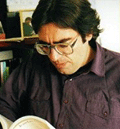|
|
|
|
The act of writing with the cinema, and by extension thinking with the cinema, is one that belongs famously to cinema’s revolutionary, Jean-Luc Godard. Godard’s willingness to incorporate filmmaking and film criticism as "something normal and natural", as simply another aspect of living and being, is truly inspiring and noble. It in fact points to the ultimate concept of an artist: a direct relation between thinking and being, a value-system that infuses every level of one’s life from the tiniest detail to the grandest gesture. Godard once wrote that Nicholas Ray was a ‘man of the cinema’, one who could not possibly perform any other profession besides that of a filmmaker. This statement could just as easily apply to Godard himself. A major conference, Forever Godard, is to be held in London this month and Senses of Cinema marks this event with two special parts devoted to Godard. The first part, in this issue, includes an excellent essay by Fergus Daly on the philosophy and aesthetic of Godard’s dismissed recent work Forever Mozart and equally fascinating essays by David Sterritt and John Conomos. The second part will appear in the next issue. It seems there is still plenty of thinking and writing to do when it comes to the cinema of Jean-Luc Godard. This issue also celebrates Australia’s own "artisan" filmmaker, Bill Mousoulis. A career spanning almost two decades and one that has included not only filmmaking but also programming and writing, Mousoulis’ latest film Desire is a ‘filmmaker’s film’ and by that I mean that it continues in a strong and visionary way the cinephile/cineaste spirit derived from Godard. And he is one of Australia’s very few in this regard. The spate of recent Australian films is a mixed bunch: Moulin Rouge, which has elicited diverging critical responses, sits alongside smaller yet well realised and well crafted films like Mullet and Sensitive New Age Killer. John Flaus’ essay on the former is as carefully modulated and rewarding as the film itself, arriving at an understanding and appreciation of the film with a subtlety and nuance rare in film criticism today. From features to shorts: the 18th St. Kilda Film Festival, held recently in Melbourne, also profiles a healthy and high level of short film activity in this country. The large program is reported on from different angles by various writers in this issue. If Senses of Cinema capitalises on the Internet’s utopian possibilities, then this is given thematic substance in this issue under the section "Planet Cinema" – a collection of essays that cross borders and limits in their concepts and ideas and that trace such a cinema of ‘villages’. In keeping tabs on ‘global cinema’, this issue also contains a good deal of international festival reports. Now, for the credits. A very big thankyou goes to all the writers who made the issue what it is. But also, and equally, thanks must go to this issue's co-editor and Senses of Cinema's Godfather, Adrian Martin, and to the indispensable editorial assistants: Mairead Phillips and Grant McDonald. This issue also marks the departure of Bill Mousoulis as Senses of Cinema's webmaster and the arrival of Chris Howard.Finally, this issue is dedicated to Bill Mousoulis. Fiona A. Villella go to Contents, Issue 14 our mission Senses of Cinema is
an online film journal devoted to the serious and eclectic discussion
of cinema. It has been set up to address a lack of cinephilic writing
in local discourse, that is, writing sprung from the desire to think and
write seriously, knowledgeably and passionately about film.
Senses of Cinema is unique in its eclecticism: it encourages articles of all styles
(casual, personal, academic, critical, impressionistic and poetic - or a
combination of these), analytical approaches (thematic, psychoanalytic,
etc) and subject matter. The only criteria that we prescribe are that all
articles are demonstrably passionate, serious, intelligent and insightful
reflections and/or analyses on the topic of cinema.
Senses of Cinema promotes various divergent "voices" that speak to a wide and
diverse audience. It aims to bring together a mix of writers: established
and emerging, theorists and un-published cinephiles, filmmakers and
film programmers, and local and international writers.
We are particularly
committed to discussing art, independent, experimental and third world cinemas
(everything from Renoir to Antonioni to Solàs to Oshima to Morrissey
to Jost to Friedrich to Snow, feature films as well as short films) , theorising
new encounters with digital technologies, and promoting writing that increases
one’s understanding and appreciation of cinema.
We recognise that an object as ephemeral and ethereal as cinema continues to fascinate,
to provoke, to inspire, to turn on, to evolve. And it is in relation to
this object that we seek to facilitate and encourage expression and appreciation.
Want to contribute to this journal?
about us
You can email Fiona.
Senses of Cinema
(ISSN 1443-4059) is published approximately bi-monthly by Senses of Cinema
Inc., with the financial assistance of the Australian Film Commission.
Copyright lies with the individual
authors. All views expressed in this journal are those of the authors and not the editors
(unless indicated).
As under the Copyright Act
1968 (Australia), no part of this journal may be reproduced by any process
without the written permission of the editors except for the purposes
of private study, research, criticism or review. These works may
be read online, downloaded and copied for the above purposes but must
not be copied for any other individuals or organisations. The work itself
must not be published in either print or electronic form, be edited or
otherwise altered or used as a teaching resource without the express permission
of the author.
Senses of Cinema Inc. - 2 Furzer Street, West Preston, Victoria, 3072, Australia. Senses of Cinema is indexed in the MLA (Modern Language
Association of America) International Bibliography and is listed in the
MLA Directory of Periodicals.
All Australian content in Senses of Cinema is indexed in APAIS
(Australian Public Affairs Information Service) of the National Library
of Australia. |
contents great directors cteq annotations top tens about us links archive search







